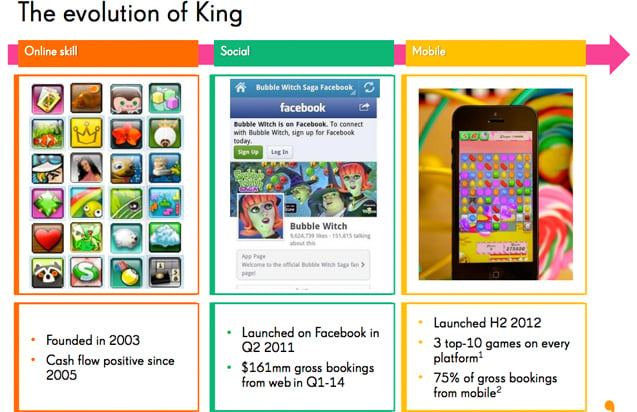The initial public offering of King Digital Entertainment (KING +0.00%), famous for developing the Candy Crush mobile game series, was one of the most expected market events this year. The IPO, which had orders representing demand that approached ten times the amount of shares the company was selling, became the largest ever IPO for a mobile social gaming company, eclipsing Zynga's (ZNGA +0.00%) 2011 offering, and helped King to raise roughly $500 million through the sale of 22.2 million shares.
The concern that King's cash cow, Candy Crush Saga, was just a one-hit wonder appeared soon after the company went public. Many investors saw in King a perfect example of a tech bubble due to its relatively high market valuation. However, King may be more than a one-hit wonder. Why do King's shares continue rising?

Source: King Digital Entertainment
Not a one-hit wonder
The mobile social gaming industry is usually regarded as a hit-or-miss business. For example, Zynga became famous as a company after the release of FarmVille in 2009. With more than 88 million active users at its popularity peak, FarmVille became the most popular title on Facebook, bringing millions of dollars in revenue to the social gaming company.
Unfortunately, Zynga was not able to replicate FarmVille's success. To make matters worse, the Facebook platform for games started experiencing a considerable decline in popularity after 2010, as gamers shifted to smartphones. By 2012, FarmVille was ranked as the seventh most popular game on Facebook. By 2014, its rank had fallen to the forty-fourth place.
Is King the next Zynga?
Investors worry that King may become the next Zynga, because most of King's revenue comes from Candy Crush Saga. By the time King went public, the game accounted for 78% of the company's gross revenue. Fears that Candy Crush Saga may end up like Zynga's FarmVille probably caused King's shares to tumble 16% in the company's first trading day.
However, although both companies are in the gaming development business, there are several differences between King and Zynga that need to be taken into consideration.
To begin with, King has generated positive cash flow from its operations for each of the past nine years. It is also more efficient than Zynga, as it generated twice the amount of revenues last year, with only one third the amount of staff as its rival. And finally, King uses a special production development method, the "fail cheap and fast" method.
Fail cheap and fast
King is consistently profitable because it is able to consistently develop new hits. According to King's co-founder Sebastian Knutsson, the secret to develop hits is simple: make simple and fast games, then distribute them to gamers around the world to determine if they are hits or duds. Duds are removed quickly, while potential hits are able to get more resources.
In other words, instead of committing a huge budget in a blockbuster development that can take years, King uses three-person development teams to create simple, single-level games in about three weeks. These games are then published on royalgames.com, a web-based tournament game site. If the game becomes popular on royalgames.com, King will allocate more developers and resources. In this way, only games that have been popular on royalgames.com are allowed to have Facebook and mobile versions.
Final Foolish takeaway
King's product development method of "fail cheap and fast" appears to be working. The company is able to avoid huge costs and keep its R&D expenses at only 6% of sales. It is also able to release more games, and maximize the probability of each title becoming a hit.
King became the first and only company ever to have three games in the top 10 grossing on Google Play in the US in Jan. 2014. And King's latest hit, Farm Heroes Saga, has been one of the top 10 grossing games on Google Play every month. Therefore, it shouldn't be surprising to know that King's stock is finally trading above its IPO price, after three months of being public.





